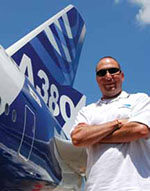
LESSONS LEARNED

The D.O.M. and HeliMx magazine team was in Las Vegas last month for HAI’s Heli-Expo. To say it was a successful show would be an understatement. The show floor was packed with exhibitors and attendees wanting to learn about the latest products and services for the helicopter industry. In case you missed it, we have included some of the news from Heli-Expo in our expanded news section this month (starting on page 43).
I flew out to Las Vegas a day early because Brandon Battles had asked me to give a one-hour guest presentation at Conklin & de Decker’s Helicopter Maintenance Management Seminar the day before the show. The title of my presentation was Lessons Learned. It focused on things I have learned from almost five years of interviewing maintenance managers for D.O.M. profile stories.
As I was preparing for my presentation, several common traits of successful maintenance managers became apparent. Here are a few of them:
Military Experience
Coincidentally, nearly two-thirds of the people I have interviewed for cover stories have a military background (including Scott Cole, this month’s profile). I don’t take into consideration if someone has a military background when choosing who to profile in a cover story; it has just happened that way. When I started talking about this during my presentation, I asked for a show of hands of how many of the maintenance managers in the audience had military experience. Around two-thirds of them raised their hands. As I reflect, it seems that serving in the military provides two advantages. First of all, it provides hands-on technical experience. More importantly, the military teaches leadership. Everyone in the military is trained how to fire a weapon, but it takes leaders to motivate soldiers to charge into a hostile environment to risk life and limb. Although DOMs aren’t facing life-and-death situations every day, strong leaders can foster a positive work culture and motivate their employees to excel.
Pilot/Mechanic
Roughly half of the maintenance managers I have interviewed have both a pilot’s and mechanic’s certificate. When I asked the seminar attendees who had both a pilot’s and mechanic’s certificate, almost half of them raised their hands. Why are pilot/mechanics successful? Well, being a pilot helps a mechanic understand the aircraft systems and operation better. They can communicate better with the pilots and understand what might be happening when a discrepancy occurs during a flight.
Strong Communication Skills
Being a good mechanic doesn’t always require strong communication skills, but successful managers hone their written and verbal communication skills. The higher up the career ladder you go, the more important communication becomes.
Humility
Humility is a trait of a good leader. Act like you know it all and you will fail. Just about every profile story I have done, the DOM was extremely humble. “My success is due to my team.” “I was fortunate to be in the right place at the right time.” “I couldn’t have done it without the support of my management.”
Don’t be afraid to ask for advice and help. Humility doesn’t equal fear or hesitation. Your job as a manager is to make decisions. Many of the decisions you make won’t be easy. Be humble but be confident. In the end, realize that there is a big difference between confidence and arrogance.
Share your knowledge
Successful managers share their knowledge and mentor others. Only an insecure manager would feel threatened by subordinates. Don’t be afraid of someone taking your job. If you hold information close to you, you will never be able to step away. You probably got the DOM job because you were one of the best mechanics, but there are others on the shop floor now who need to grow and become better mechanics. If you go back to doing maintenance tasks, you will neglect your management responsibilities and your employees will not grow.
Train your replacement. Just because you might have been promoted to manager without the knowledge to do your job doesn’t mean you have to let it happen to the next person. Besides, you want some time off, don’t you? Who wants to be on vacation and glued to their smart phone because the shop can’t function without them?
What lessons have you learned? What do you think it takes to be a successful maintenance manager?
 Thanks for reading, and we appreciate your feedback!
Thanks for reading, and we appreciate your feedback!
Joe Escobar
